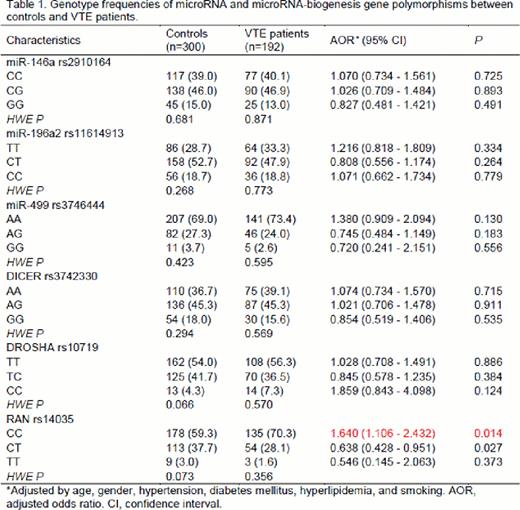Abstract
Abstract 3395
Venous thromboembolism (VTE), including deep vein thrombosis (DVT) and pulmonary embolism (PE), represents a public health concern in Western and Asian countries. Venous thromboembolism often complicates the course of hospitalized patients but may also affect ambulatory and otherwise healthy people. The classic risk factors for VTE are cancer, surgery, prolonged immobilization, fracture, paralysis, oral contraceptive use, and hereditary coagulopathies. In addition to these classic risk factors, microparticle containing microRNA is a known risk factor for both arterial and venous thrombosis. The aim of study was to investigate genetic association between microRNAs or microRNA-biogenesis genes and VTE. We selected 6 well-studied polymorphisms of miR-146a (rs2910164), miR-196a2 (rs11614913), miR-499 (rs3746444), DICER (rs3742330), DROSHA (rs10719), and RAN (rs14035).
Patients with consecutive VTE with recent (<6 months) objective diagnosis of DVT or PE, who visited to the CHA Bundang Medical Center (Seongnam, Korea) or Keimyung University hospital (Daegu, Korea) between May 2005 and December 2009, were enrolled in the study. We enrolled the patients with symptomatic VTE and excluded the patients with asymptomatic VTE. Venous thromboembolism was defined as provoked or unprovoked, depending on the presence or absence of any of the following risk factors: recent surgery (<3 months), recent trauma/fracture (<3 months), immobilization (>7 days), malignancy, stroke, severe medical disease, autoimmune disease, pregnancy, use of oral contraceptives, and known inherited thrombophilia. Venous thromboembolism was classified as provoked in the presence of at least one of these risk factors. The control group was selected among patients visiting the CHA Bundang Health Promotion Center for periodic health examinations, who had no medical history of VTE. The Institutional Review Board of CHA Bundang Medical Center approved the research protocol and written informed consent was obtained from all participating individuals. Genotyping of microRNA and microRNA-biogenesis gene polymorphisms was performed by polymerase chain reaction-restriction fragment length polymorphism (PCR-RFLP) assay. Multivariate logistic regression was used to calculate strength of association.
The genetic distributions of microRNA and microRNA-biogenesis gene polymorphisms were in Hardy-Weinberg equilibrium (Table 1). RAN rs14035 CC genotype was associated with increased VTE risk (adjusted odds ratio [AOR], 1.640; 95% confidence interval [CI], 1.106–2.432; P=0.014; Table 1). The statistical significance of RAN rs14035 CC was strengthened in unprovoked VTE patients (AOR, 2.478; 95% CI, 1.410–4.357; P=0.002; Table 2). Although other microRNA-related polymorphisms showed differences between controls and VTE patients, there were not positive statistical significances. In conclusion, RAN rs14035 CC may be a possible predisposing factor for VTE development.
No relevant conflicts of interest to declare.
Author notes
Asterisk with author names denotes non-ASH members.



This feature is available to Subscribers Only
Sign In or Create an Account Close Modal